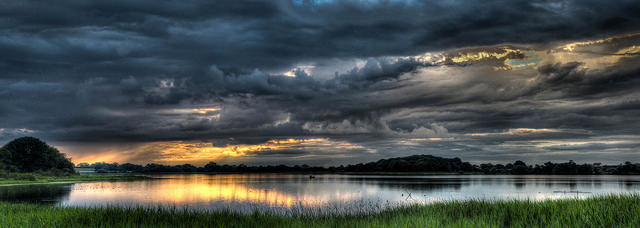Weather photography captures some fascinating and dramatic images, just as sunrise and sunset does. Whether you are capturing fog, a dramatic cloudscape, the rain or snow, the weather can set the mood for your final image.
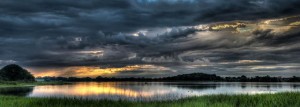
There are a variety of effective techniques used to capture images of the weather. However, you first need to think about protecting your camera from the elements, especially moisture. They are many commercially available products to weather proof your camera. They are very affordable and with the price when you consider the cost of your camera and lenses. In a pinch you can fabricate ad hoc cover from a plastic bag. In fact it’s a good idea to keep a plastic bag in your camera bag just in case you find yourself caught in the rain.
Many of the tips techniques that you have already learned are applicable to weather photography. What follows are some tips for photographing specific types of weather.
Snow
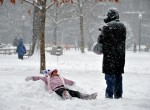
It doesn’t matter where you live, the first snow of the season has a magical quality and is exciting, bringing most people out to enjoy it. Something to be aware of is how your light meter works and is affected by large areas of light or dark area in your scene. To get a proper exposure in snowy scene you need to set your exposure compensation by +1 or +2 to avoid underexposure.
Falling snow and rain
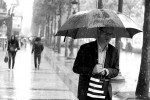
Look for medium or dark background to show rain or snow streaking through the air. The slower your shutter speed the longer the steaks will appear in your image. For streaking (blurred motion) use a shutter speed of 1/30 second or shower. Of course you can use a fast shutter speed and freeze the fall of snow and rain (stop motion).
Foggy conditions

For give a scene a feeling of intrigue or mystery. Because of the excess moisture that creates the fog, sharpness is decreased often causing the scene to look mystical or dreamy. Fog can vary from a light gray to nearly white, making metering for exposure a little tricky. For best results meter the light for your subject and use custom white balance.
Stormy skies
Dramatic cloud formations with their rich colors are a favorite subject for photographers around the World. Grab your camera and s wife angle lens when you see storm clouds gathering. Find an aesthetically pleasing foreground object and allow the storm clouds to lead your eye to it. Similar to overly bright scenes, like snowy weather, you have to adjust your exposure compensation in order for your DSLR’s light meter to be accurate. In this case, adjust your exposure by -1/3 to -1/2 stops to avoid overexposure.
Tips for weather photography
-
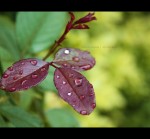
Rain Drops Let contrast work for you. Overcast and rainy weather cause colors to be more saturated. Take advantage of this by including the saturated colors in you pictures of weather.
- Know the weather. Is important to learn as much as possible about weather and how the Sun illuminates the different kinds of clouds.
- Don’t stop shooting when the weather clears up. Take some time after the rain photography the freshly washed buildings, streets, and even the variation.
Photo Credits
The photographs on this page are Creative Commons 2.0 License images. My thanks to the contributors.
“Dramatic Weather” by Mark Freeth
“Rain Drops” by Bhavna Sayana
“Eye Contact” by luisjoRN
“Gothic Fog” by Andrew Moore
“Snow Angel” by Kevin Burkett
